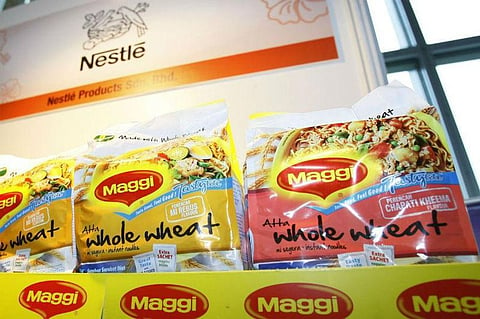
- Home
- न्यूजग्राम
- NewsGram USA
- India
- World
- Politics
- Entertainment
- Culture
- Lifestyle
- Economy
- Sports
- Sp. Coverage
- Misc.
- NewsGram Exclusive
- Jobs / Internships

New Delhi: Sometimes back, Nestle India seemed to have found a bonus in an earthquake. Following the devastating tremors that rocked Nepal, it faced a demand to supply as many as 200,000 packets of Maggi noodles as relief aid from India. But, situation somersaulted after the controversy that tests in Indian labs detected the presence of lead above the permissible limit in the tastemaker. Consequently, the sale of Maggi was banned.
However, it stormed back passing all the laboratory tests in November. However, are the chemicals that enhance the taste of Maggi safe?
Though Monosodium Glutamate (MSG) intensifies meaty and savory flavour in food. Japanese biochemist Kikunae Ikeda identified the unique flavour and coined it as 'unani', Japanese for the fifth taste besides sweet, sour, salty and bitter. Strangely, glutamic acid is one of the most abundant naturally occurring non-essential amino acids and can be traced in many vegetables and fruits including tomatoes, potatoes and mushrooms.
Ajinomoto is a Tokyo-based company which produces MSG besides seasonings, cooking oils, TV dinners, sweeteners and pharmaceuticals. It operates in 26 countries and has 27,500 plus manpower.
Reports of side effects attributed to MSG first mushroomed in 1968. Numbness in the back of the neck, arm, weakness and heart palpitations were listed among the major ailments caused by MSG.
Though the US enlisted MSG as generally recognized as safe (GRAS) category, but large doses of MSG can induce headaches and other feelings of discomfort collectively known as 'Chinese Restaurant Syndrome". Other common symptoms of MSG are- headache, flushing, severe sweating, facial pressure or tightness, numbness, tingling or burning sensation in face, rapid fluttering, chest pain and nausea. Since, bulk of Maggi consumers are minors, the Indian government came down heavily on the snack and clamped the ban.
Lead, another toxic element traced in the tastemaker sachet in Maggi packets too has its satanic qualities. Lead poisoning undoubtedly is a serious and, sometimes, fatal condition. The highly toxic metal if accumulates in the human body can cause irreversible health hazards. Children are more prone to lead poisoning since their brain and nervous system are still developing.
The poisoning can cause severe mental and physical impairment. However, lead poisoning occurs over a period of months and years. Abdominal pain, abdominal cramps, aggressive behavior, constipation, sleep disorder, headache, loss of appetite, fatigue, kidney dysfunction, anemia, vomiting, seizure, encephalopathy are the notable symptoms if the human body gets exposed to lead. While low-level presence in adults is not harmful but similar levels in children is an unambiguous concern.
In general, acid foods and drinks leach lead out of dishes much faster than non-acid foods. Spaghetti sauce, salsa, soy sauce, orange juice, applesauce, coffee, tea, cola drinks, and salad dressing are examples of acid foods. The longer the food stays in contact with a dish surface that contains lead, the more lead will be leached into the food. Heating up food in a lead-containing dish can speed up the lead-leaching process. A combination of these factors will make the problem even worse. The sachet body of the tastemaker in Maggie reportedly showed traces of lead.
Maggi might be back, but the chemicals are still present, maybe at a prescribed limit. But is it worth it?
